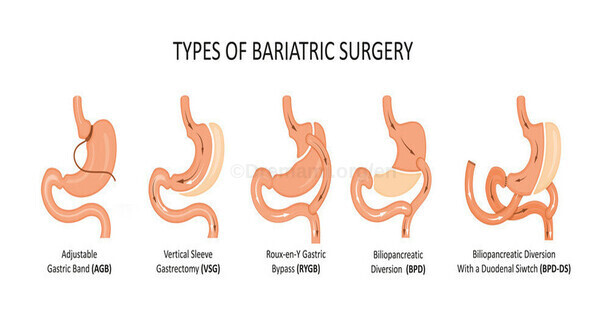The first month after bariatric surgery is the most critical time for patients, who must achieve the best results by performing postoperative care.
Don’t miss this article from Dr. Farbad Emami Yeganeh’s website.
Introduction:
The first month after gastric sleeve or bypass surgery is the golden time after performing this procedure.
During this period, the patient’s body almost recovers and adapts to the conditions of life after the operation.
During this period, focusing on your surgeon’s instructions and healthy eating habits is necessary.
You should also have enough rest to strengthen your immune system and improve your physical strength.
Do not forget to exercise, walk, and make physical activity your daily routine. Drinking enough water is very important to keep the body hydrated.
In addition, avoid eating and drinking foods that irritate your digestive system.
The first week after bariatric surgeries:
In the first days of the first month after bariatric surgery, the patient may be hospitalized for one to three days.
During this period, all the patient’s vital signs and health status are monitored.
Then, if the condition is stable, the patient is discharged. The first week after gastric sleeve or bypass surgery is the most challenging period for patients.
The patient’s pain is controlled during the first week using authorized painkillers prescribed by the surgeon. Starting physical activity by walking can also reduce the severity of the patient’s pain.
The surgeon determines the patient’s activity level in the first days of the first month after bariatric surgery. The patient should visit the surgeon’s office for the first time this week to check his progress.
During this week, the patient is only allowed to consume clear liquids.
Weight loss this week is between 2 and 6 kg. Things like staying hydrated and avoiding alcoholic, carbonated, caffeinated drinks and smoking during this week and the first month after gastric sleeve or gastric bypass are critical.
The second week after bariatric surgery:
The patient will feel more comfortable with his body changes in the second week of the first month after bariatric surgery. The patient’s body adapted to the new conditions for a week and got used to the diet. This week, according to the diagnosis of the surgeon and the nutrition team, changes will be made to the patient’s diet.
The amount of protein consumed this week has increased, and consuming sugar and fatty foods is still prohibited.
Walking this week should also be continued, and its duration should be increased. According to the surgeon’s diagnosis, the patient may be allowed to do some light sports.
The third week after bariatric surgery:
In the third week of the first month after bariatric surgery, a significant improvement in the patient’s energy and health levels can be seen. The patient’s diet continues as before, and the amount of protein consumed, essential supplements, and vitamins and minerals needed by the body may be increased.
It is also forbidden to consume high-fat and sugar-containing foods this week.
This week, the patient’s physical activity level will be increased, and yoga and strength exercises will be added to his walking and stretching exercises.
Lifting heavy weights and moving and pushing heavy objects are prohibited during this period.
The fourth week of the first month after bariatric surgery:
In the fourth week of the first month after bariatric surgery, it is time for the patient to return to his regular routine.
A month has passed since the day of the gastric sleeve or gastric bypass operation, and the body has almost adapted to the changes made in the digestive system.
After one month, exercise and healthy eating habits have become a part of the patient’s life, and the patient can start heavy sports activities such as using weights and running.
What is the diet for the fourth week?
The diet continues in the fourth week of the first month after bariatric surgery. This week, the patient can start eating puree and gradually add all the food to his diet.
This week, the amount of protein consumed should be between 60 and 80 grams daily. The consumption of chicken, turkey, fish, and low-fat dairy products is not prohibited this week.
Fruits such as bananas, apples and soft vegetables such as pumpkin and mashed carrots can be added to the diet this week.
The number of meals should be increased over time, and the size of each meal should be reduced.
This prevents overeating and ensures the supply of nutrients needed by the body.
Consumption of solid and hard foods is still prohibited this week. Symptoms such as nausea, vomiting, pain, constipation, and diarrhea after gastric sleeve or gastric bypass should be reported to the surgeon immediately.
The rate of weight loss in the first month after bariatric surgery:
In general, patients are expected to lose 8 to 12 kilos of initial weight in the first month after bariatric surgery.
You can expect to lose 2 to 4 kilograms of weight during the week.
Finally, the patient will lose between 50 and 60 % of his initial excess weight for one year after the gastric sleeve or gastric bypass.
Most weight loss occurs during the first year; the rest of the extra weight will decrease during the second year.
The weight lost after gastric sleeve or bypass surgery depends on various factors, including the initial weight, the level of adherence to instructions and postoperative care, and changes in the patient’s lifestyle.
As a result, weight changes are different in different patients, and all patients should not be compared with each other.
Also, some people lose weight faster, and others lose weight more slowly due to high metabolism.
In addition, some people experience weight loss or gain again due to a lack of postoperative care.
As a result, periodic monitoring is critical to control the patient’s condition and progress in the weight loss process.
The feeling of recovery after bariatric surgery:
The patient will feel the healing process approximately three weeks after the first month after bariatric surgery.
After gastric sleeve or gastric bypass surgery, the patient’s body needs two to three weeks of rest to recover and get used to new conditions.
Reducing the amount of food consumed and the changes made in the patient’s body can lead to a feeling of weakness in him.
As a result, the patient needs to prevent the occurrence of physical weakness and disability by carefully consuming supplements and food, exercising, etc.
The patient can return to work part-time two weeks after the operation. But after a month, he can resume his full-time job (8 hours daily).
Support of family and friends in the first month after bariatric surgery:
The patient needs much psychological support and encouragement in the first month after bariatric surgery. After gastric sleeve and gastric bypass, it is challenging for many patients to change their lifestyle. As a result, patients should be psychologically supported for adherence during this path.
Supporting patients in the first month is more important than ever. Because in the first days after being discharged from the hospital, the patient may need help to do his tasks such as bathing and going to the toilet.
Therefore, the patient’s friends and family must be with him in the first days so that he can bear less mental pressure.
The bariatric surgery team of Dr. Farbad Emami Yeganeh:
The surgical team of Dr. Farbad Emami Yeganeh is a professional in the field of bariatric surgery. By supporting patients, this medical team makes bariatric surgery very simple and relaxing for them.
These supports will continue not only before and during the operation but also after the operation until the patient fully recovers.







